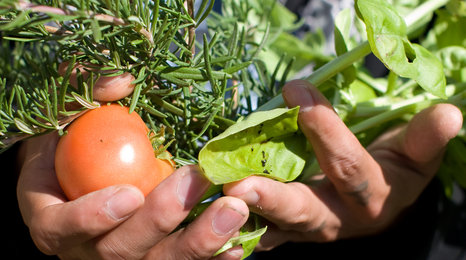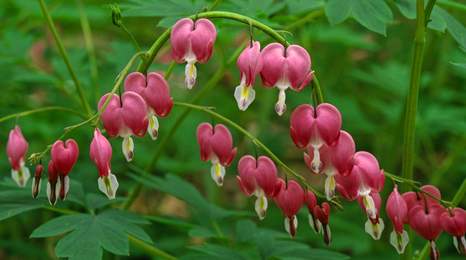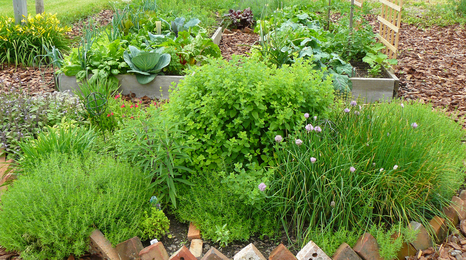Planting and growing guides
Whether you're a seasoned landscaper, just starting to garden, or need some help with an established plot, we have guidelines and best practices to help you grow healthy plants in your own yard and garden.
Try What's wrong with my plant? for a step-by-step guide through diagnosing a plant problem.
Starting, maintaining and harvesting your garden
The Upper Midwest home gardening calendar shows recommended timing for everything you need to do to grow great flower and vegetable gardens in Minnesota.
Check the Master Gardener Seed Trial recommendations each year for newly tested varieties of flowers and vegetables that grow well in Minnesota gardens.
- Clean and disinfect gardening tools and containers — Properly disinfecting your tools can help keep diseases out of your garden and potted plants.
- Companion planting — Companion planting is a great way to use space efficiently in the garden.
- Extending the growing season — Practical methods for heating the soil in spring and protecting your garden through the first frost.
- Growing healthy vegetables — Planning ahead will help you avoid common diseases and pests that can affect a healthy harvest.
- Growing herbs in home gardens
- Planting the vegetable garden
- Planting for fall harvest — When you plant is as important as where and how if you want vegetables well into the fall.
- Preventing plant diseases in the garden
- Raised bed gardens
- Starting seeds indoors
- Growing edible container gardens(video)
- Cultivo de verduras, flores y hierbas en contenedores(video)
- Composting in home gardens
- Controlling weeds in home gardens
- Cover crops and green manure in home gardens - Cover crops form a living mulch in gardens because they grow thickly among each other. They help reduce soil splash and erosion, and keep weeds in check.
- Herbicide injury on garden plants - Fruit, vegetable and ornamental plants can be injured by drift from herbicides that are sprayed on nearby lawns and crop fields to kill weeds.
Small-scale hydroponics — Hydroponics is a method of growing plants without soil. You can grow hydroponically all year long.
- Clean and disinfect gardening tools and containers — Properly disinfecting your tools can help keep diseases out of your garden and potted plants.
- Companion planting — Companion planting is a great way to use space efficiently in the garden. It also can protect your plants from some insects.
- Managing plant diseases in the home garden — Planning will help you avoid common diseases and pests that can affect a healthy harvest.
- Jumping worms
- Non-pest issues in cool-season crops — Temperature deviations in spring can cause issues that make cool-season vegetables like broccoli, cabbage, cauliflower, spinach and lettuce bitter or cause the crop to fail.
- Preventing pests in your yard and garden — Chemical and nonchemical ways to control insects, plant diseases, weeds and wildlife.
- Preventing plant diseases in the garden — An illustration of sustainable practices for keeping your garden disease-free.
Care and maintenance of lawns and landscape plants
The Minnesota lawn care calendar is a handy schedule of activities that will help you keep your lawn healthy throughout the year.
- Clean and disinfect gardening tools and containers
- The effects of deicing salts on landscapes
- Hiring a tree care professional
- How to manage flood damage to trees
- How to manage deer damage on trees and other plants
- How to manage vole damage on lawns, trees and shrubs
- Planting and transplanting trees and shrubs
- Pruning trees and shrubs
- Staking and guying trees
- Storm damage to landscape trees
- Watering established trees and shrubs
- Watering newly planted trees and shrubs
- Winter care for trees and shrubs
- Woody vegetation control
- Video: Pruning Hydrangeas: Equipment, techniques and timing(7:33)
The Best Plants for 30 Tough Sites (2007)— Download a book of recommendations from Master Gardeners on the best plants for 30 tough garden sites, such as dry shade, slopes, lakeshores, etc. Includes lists of plants with special traits such as self-seeding, long-blooming, and minimal litter trees.
Gardening in the shade — Understand shady areas in your yard and how to create gardens in them.
- Clean and disinfect gardening tools and containers
Properly disinfecting your tools can help keep diseases out of your garden and potted plants. - Herbicide injury on garden plants - Fruit, vegetable and ornamental plants can be injured by drift from herbicides that are sprayed on nearby lawns and crop fields to kill weeds.
- How to manage deer damage on trees and other plants
- Protecting plants from deer - RSDP research report
- How to manage vole damage on lawns, trees and shrubs
- How to trap moles
- Preventing pests in your yard and garden
Grow and care for houseplants
- Clean and disinfect gardening tools and containers
Properly disinfecting your tools can help keep diseases out of your garden and potted plants. - Growing bulbs indoors
- Light requirements for houseplants
- Starting seeds indoors
- Managing insects on indoor plants
Stay up to date
- Read Yard and Garden News
- Listen to the Smart Gardens and What's Killing My Kale? podcasts.




